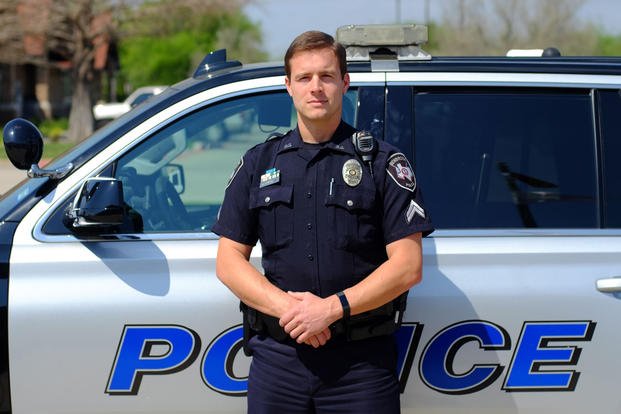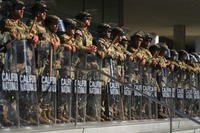Just because you didn't serve with the military police doesn't mean a career in criminal justice is off the table. One of the most important lessons you can learn about your service to this country is that your military occupational specialty (MOS) doesn't dictate your future. And this is especially true for careers in criminal justice.
Related article: Law Enforcement Career Advice
Don't have your degree? No problem. Some police departments have programs that waive initial degree requirements and allow veterans to serve as a police officer while earning their degree part time. In addition, many law enforcement agencies give hiring preferences for veterans.
Nicholas Albert, who served with the Army's 101st Airborne, is an officer in the Pleasanton, Calif., Police Department. He said at a recent Hire Our Heroes job fair, "While law enforcement might not be the choice for every veteran, it was a good choice for me, and I enjoy making a difference in the town that I grew up in."
Officer Albert began his law enforcement career with the Oakland Police Department in 2007 and later joined the Pleasanton Police Department in 2011. He is currently assigned to the department's Special Enforcement Unit and holds multiple collateral assignments, including force options instructor, first aid instructor and is a member of the East County Tactical Team.
Pro tip: Be sure to inquire about any veterans hiring program or preference points when you speak with a law enforcement recruiter.
Typically, the criminal justice system consists of three major components: (1) law enforcement (police, sheriffs, marshals, border patrol, national parks); (2) adjudication (courts, which include judges, prosecutors, defense lawyers); and (3) corrections (prison officials, probation officers and parole officers). In a criminal justice system, these distinct agencies operate together under the rule of law and are the principal means of maintaining the rule of law within society.
There are many reasons why law enforcement agencies actively seek veterans to employ within their ranks and why veterans are attracted to the field of law enforcement upon retirement. For one, the structure of a police force is very similar to that of the military. Secondly, many of the same traits that make a person successful in the military are also required for success in a law enforcement agency. Here are five reasons why veterans make good law enforcement candidates:
1. Veterans Possess a High Level of Discipline, Integrity and Responsibility
There is great pride in doing your job in the military and doing it to the best of your ability. Service members enjoy a community of shared values; likewise, many in law enforcement do, too. It's easy to draw the lines of comparison between military service and law enforcement when it comes to maintaining a high degree of discipline, integrity and personal responsibility.
2. Teamwork
Military veterans are not only trained to contribute to a team in order to thrive, but they also learn that they have to count on a team to survive. Likewise, police officers rely on each other to keep themselves and the public safe.
3. Critical Thinking, Especially During High-Stress Situations
As in the military, police officers require a high degree of critical thinking skills, including during high-stress scenarios. The military does a good job at training personnel to think and act quickly during life-or-death situations.
4. A Community of Shared Values
As with the criminal justice system, most people join the military to be a part of something larger than themselves, to give back, and to help others. The Toys for Tots program, a wildly successful toy donation program started by the Marine Corps, is a good example of military community engagement. Similarly, the Police Athletic League, a national police department athletic program, helps pair underserved children with police mentors while learning the importance of teamwork in athletics.
5. A Desire to Serve Others
Ask any service member you know why they joined the military. Chances are that part of their answer would include the fact that they wanted to serve others and make a difference. The same could be said of police officers.
In both the military and law enforcement, there is a culture of "to protect and serve." What's not often talked about is the critical role service members play in many natural disasters. They come with food and aid worldwide. Law enforcement, while working on a local level, has many community aid programs with the goal of strengthening a community, especially the underserved and vulnerable.
In a recent Behind the Badge article, Lt. Bob Wright with the Tustin, Calif., Police Department says, "I think law enforcement is an easy transition [for veterans]. We find that they already have a sense of service and commitment, and they bring that with them when they come to the police occupation."
According to the U.S. Justice Department, "nearly 25% of the police force in the United States has a military background, and that's, in part, because of how much these careers complement each other."
While veterans don't have to ditch their MOS, careers in law enforcement and the wider criminal justice system are actively seeking military veterans, and veterans would do well to consider their options in this career field.
To learn more about career opportunities in law enforcement, Military.com has you covered. Find the right law enforcement career for you here.
-- Sean Mclain Brown can be reached at sean.brown@military.com. Follow him on Twitter at @seanmclainbrown
Want to Know More About the Military?
Be sure to get the latest news about the U.S. military, as well as critical info about how to join and all the benefits of service. Subscribe to Military.com and receive customized updates delivered straight to your inbox.
















